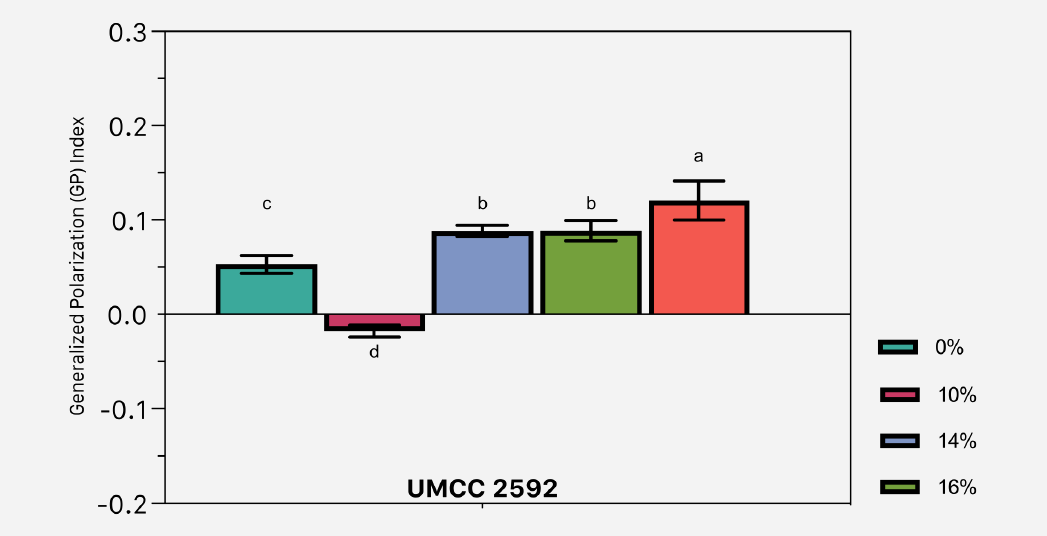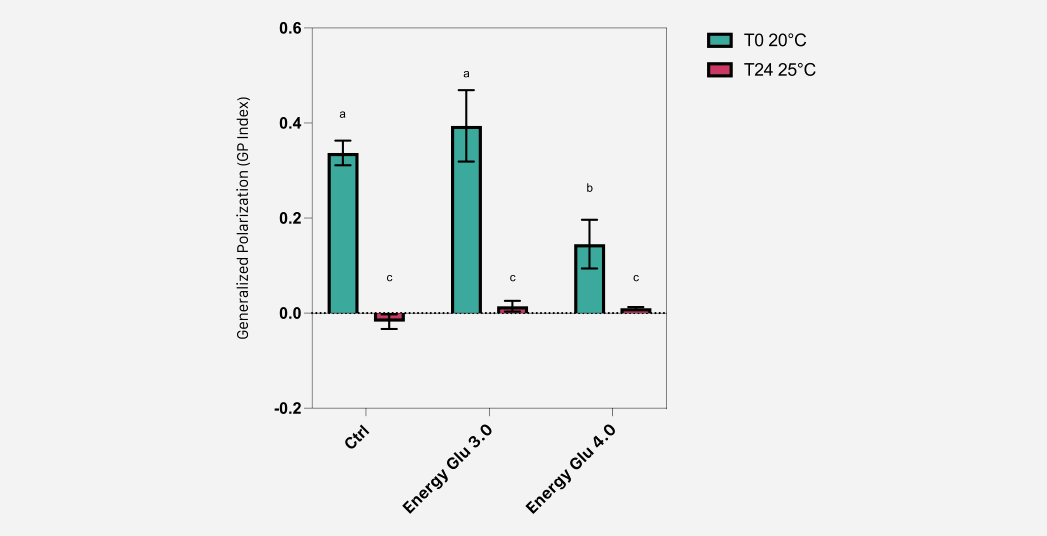
Study in collaboration with
the University of Modena and Reggio Emilia
Effect of ethanol stress and low temperatures on yeast strains of enological interest
Membrane fluidity is the focus of recent research conducted by AEB in collaboration with the University of Modena and Reggio Emilia.
The study presents the results on membrane fluidity in enological yeast strains exposed to different stress conditions. The modulation of fluidity highlights a strategy used by yeast cells to adapt to such stress. This parameter is useful for identifying tolerant strains and adjuncts that ensure an optimal fermentation.
The effect of ethanol stress on membrane fluidity
Membrane fluidity, being an important factor for maintaining membrane integrity and for the adaptation of yeast cells, has been studied under ethanol stress conditions. In this preliminary investigation, UMCC 2592 was selected among the strains of the species S. cerevisiae for its high ethanol tolerance, having already been studied for its excellent fermentative capabilities.

Figure 1
Membrane fluidity values, indicated as GP index, of the S. cerevisiae strain UMCC 2592 under different ethanol stress conditions (0, 10, 14, 16, and 18% v/v). Different letters indicate significant differences (p<0.05).
After 24 hours of treatment with 10% v/v ethanol, the S. cerevisiae strain (UMCC 2592) showed a significant increase in membrane fluidity compared to the untreated control. However, at ethanol concentrations ranging from 14% v/v to 18% v/v, the fluidity values decreased (Fig. 1). This behavior appears to be attributable to an adaptive response of the yeast cells, implemented to reduce the fluidizing impact induced by ethanol.
The effect of rehydration at low temperatures on membrane fluidity
The rehydration of ADY strains at low temperatures, which are not optimal for yeast, is one of the challenges faced in wineries, both for practical and economic reasons. To address this, two rehydration nutrients were tested to evaluate their effect on the revitalization process of the ADY strain S. cerevisiae UMCC 2592.
The results show that the strain revitalized at 20°C under all conditions exhibits reduced membrane fluidity compared to the same strain cultivated at 25°C for 24 hours. This behavior is consistent with the literature, which attributes membrane stiffening to revitalization at lower temperatures than those optimal for yeast. However, after 24 hours at 25°C, a reduction in membrane rigidity and lower GP values are observed. Notably, the strain revitalized with the nutrient FERMOPLUS Energy Glu 4.0 shows less significant changes in the GP index compared to the other two conditions, suggesting greater efficacy of this nutrient in reducing membrane rigidity at 20°C, and consequently, smaller fluidity fluctuations after 24 hours at 25°C (Fig. 2).

Figure 2
Membrane fluidity values, indicated as GP index, of the S. cerevisiae strain (UMCC 2592) revitalized at 20°C with two different additives: FERMOPLUS Energy Glu 3.0 and FERMOPLUS Energy Glu 4.0, measured at the start of fermentation (T0) and after 24 hours at 25°C (T24). Different letters indicate significant differences (p < 0.05).


 United Kingdom
United Kingdom





